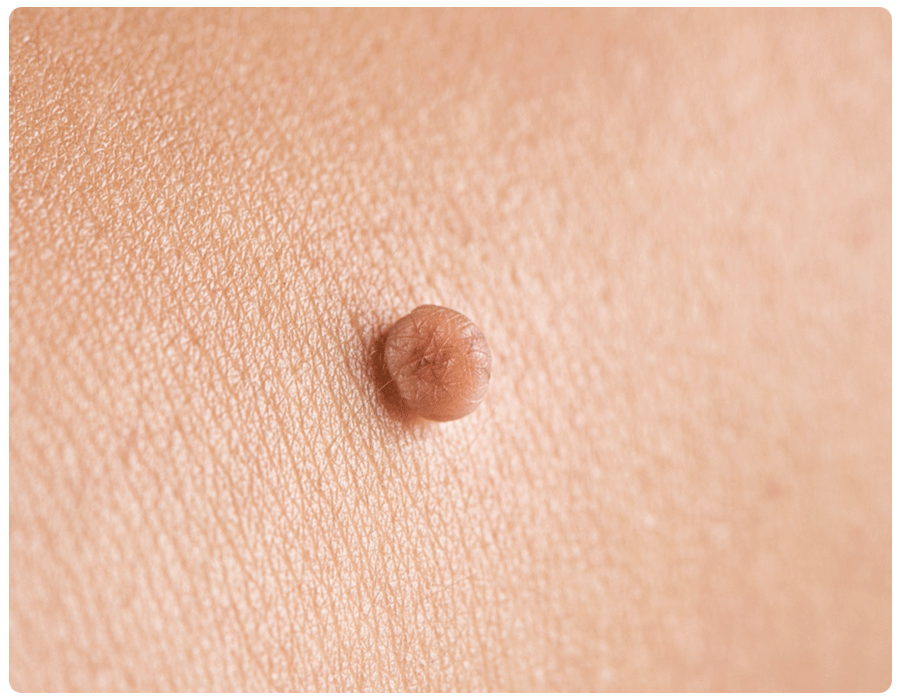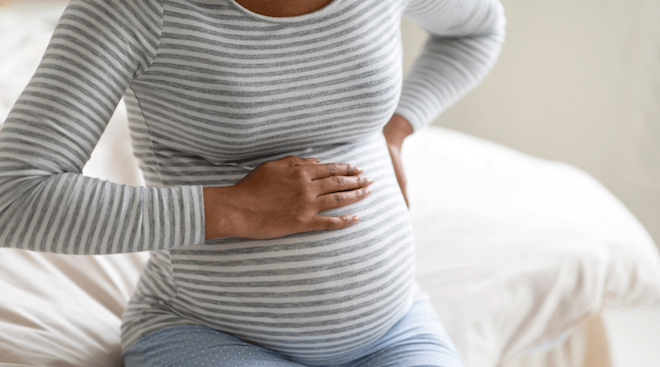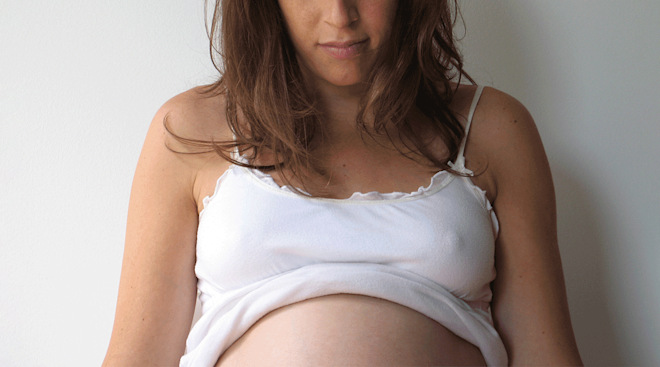Why You Might Get Skin Tags During Pregnancy
Brace yourself for more than growing a baby bump during your pregnancy. You might find yourself growing something else too. Pregnancy skin tags are normal and common, so don’t be alarmed. Once you know what they are, where they come from and how to treat them, you’ll feel better about these tiny little visitors. Read on to learn what causes skin tags during pregnancy, and how and when you can say goodbye to them.
A skin tag (medically known as an acrochordon) is a small, soft skin growth on the body. According to the Cleveland Clinic, these generally harmless growths are usually the same color as your skin and measure between 1 and 5 millimeters in size, but can also be larger. Most people say they resemble a raised or lengthened mole hanging off the skin.
Skin tags are extremely common during pregnancy. In fact, Michael Green, MD, a board-certified ob-gyn in Lake Arrowhead, California, says many people—pregnant or not—will grow skin tags at some point in their lives.
Although skin tags can occur anytime during pregnancy, most people notice them pop up in the second and third trimesters. “[Those] who’ve had multiple pregnancies may not notice the skin tag formation with the first pregnancy, but do with the second,” says Maya Thosani, MD, a dermatologist and owner of Modern Dermatology in Scottsdale, Arizona.
Experts agree that pregnancy skin tags are most likely a result of two things: frequent skin friction from weight gain and fluctuating pregnancy hormones.
- Skin Friction. Skin tags form in hot, moist areas where the skin rubs together. And when your body is putting on weight preparing for baby, this happens more and more. “As pregnancy progresses, there are areas of the body that have increased friction–skinfold body parts such as the axillae, neck, eyelids and groin,” explains Thosani.
- Pregnancy Hormones. Hormonal shifts in the body are also at play. Thosani notes that the commonly elevated levels of female sex hormones progesterone and estrogen during pregnancy can also increase the development of skin tags.
Most pregnancy skin tags are harmless. But, if they form in an area that constantly rubs against clothing or jewelry, they can become irritated. In this case, there are options for people who want relief.
Thankfully, there are a few ways a doctor can remove skin tags. For smaller growths, they’ll often opt for cryosurgery. Don’t be intimidated by the name. “Your dermatologist will use a cryogun to spray liquid nitrogen at the narrow base of the skin tag to freeze it for a few seconds, causing it to eventually scab, flake up and fall off,” explains Thosani. For tiny skin tags, Green notes that some doctors can even simply snip them off with scissors after being evaluated.
A larger pregnancy skin tag may have a small blood vessel attached to it–essentially feeding it. In this case, your doctor will use local anesthesia and remove the skin tag with a snip excision, and then finish by cauterizing the wound to stop the bleeding.
You might come across some home remedies to try, but these are generally not advisable. It’s especially important to know that doctors don’t recommend removing skin tags by yourself. While at-home cryotherapy kits are available over the counter, they’re not the same. Most contain dimethyl ether, propane and isobutane. “These are nothing like the liquid nitrogen that’s at your local dermatologist’s office, and despite their claims, they cause significant risks of dyspigmentation and chemical burn reaction,” notes Thosani.
Is it safe to get skin tags removed while pregnant?
Most experts agree that it’s best to wait until after birth to see if skin tags will go away on their own. If you have a skin tag that’s bothersome, bleeding or painful, though, cryosurgery removal performed by a doctor has been considered safe and effective during pregnancy.
Post-pregnancy skin tag resolution can vary from person to person. “Some may find that the skin tags gradually disappear in the weeks or months following childbirth due to hormonal changes and weight loss,” says Green. However, some skin tags may persist and cause discomfort.
Since they mostly form because of pregnancy weight gain and hormone fluctuations, there isn’t much you can do to prevent skin tags during pregnancy. That said, since skin friction plays a role in the chance of pregnancy skin tags forming, applying a moisturizer to body fold areas can help lower the chance of them developing. “For extra help, a greasier option such as Vaseline, Aquaphor, other healing ointment or a solid cocoa-butter balm can be applied to high-friction areas,” says Thosani. Here’s another pro tip: Wear loose, comfortable clothing to help minimize unnecessary rubbing.
Skin tags are generally harmless. But Green recommends seeing a doctor if they become discolored, painful or start to bleed. Thosani adds that if you notice several skin tags developing all at once, it could be a sign of insulin resistance or high cholesterol, and blood work might be necessary.
Keep in mind that some skin tags can also become twisted and lose their blood supply. These can get infected and will need to be removed to prevent further complications. Talk to your doctor or dermatologist if you have any concerns or want to show them anything potentially troubling.
Please note: The Bump and the materials and information it contains are not intended to, and do not constitute, medical or other health advice or diagnosis and should not be used as such. You should always consult with a qualified physician or health professional about your specific circumstances.
Plus, more from The Bump:
Michael Green, MD, is a board-certified ob-gyn in Lake Arrowhead, CA. He attended St. Louis University of Medicine, where he received his medical degree and has been in practice for over 30 years since. Dr. Green is now a Chief Medical Officer at Winona and an OB hospitalist and site director at Northridge Medical Center.
Maya Thosani, MD, is a dermatologist and owner of Modern Dermatology in Scottsdale, AZ. She attended Rutgers Medical School, formerly the University of Medicine and Dentistry of New Jersey, and now has over 15 years of experience in cutaneous oncology and dermatologic surgery.
Cleveland Clinic, Skin Tags (Acrochordons)
Learn how we ensure the accuracy of our content through our editorial and medical review process.
Navigate forward to interact with the calendar and select a date. Press the question mark key to get the keyboard shortcuts for changing dates.






















































